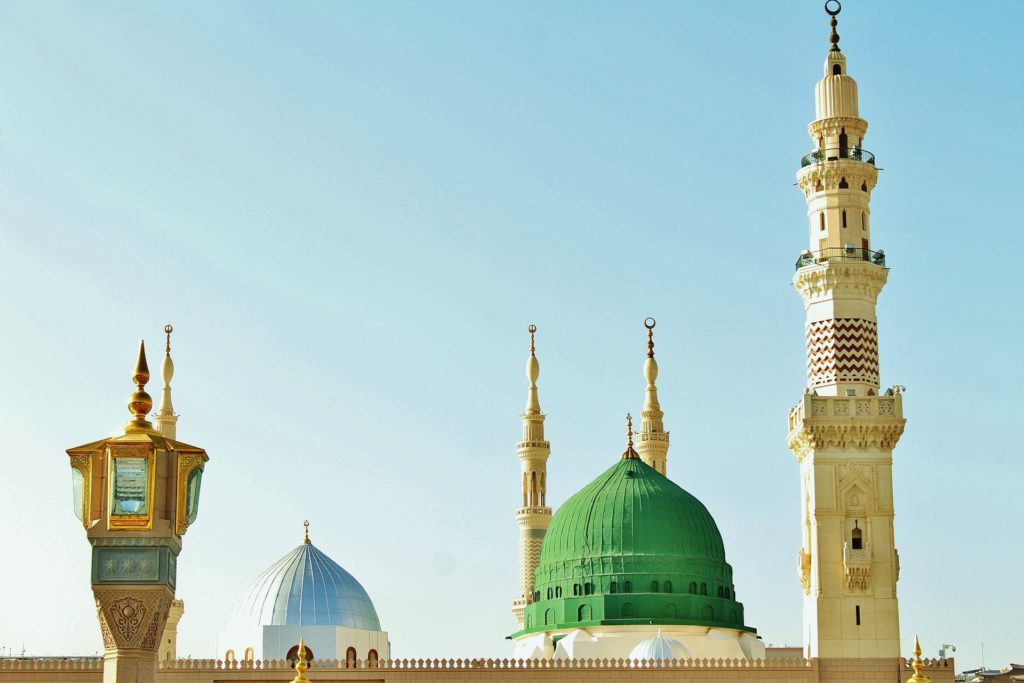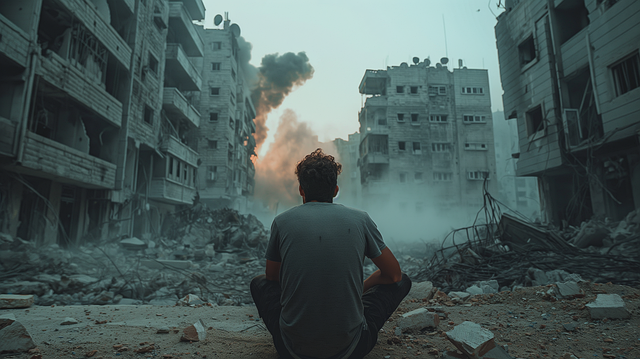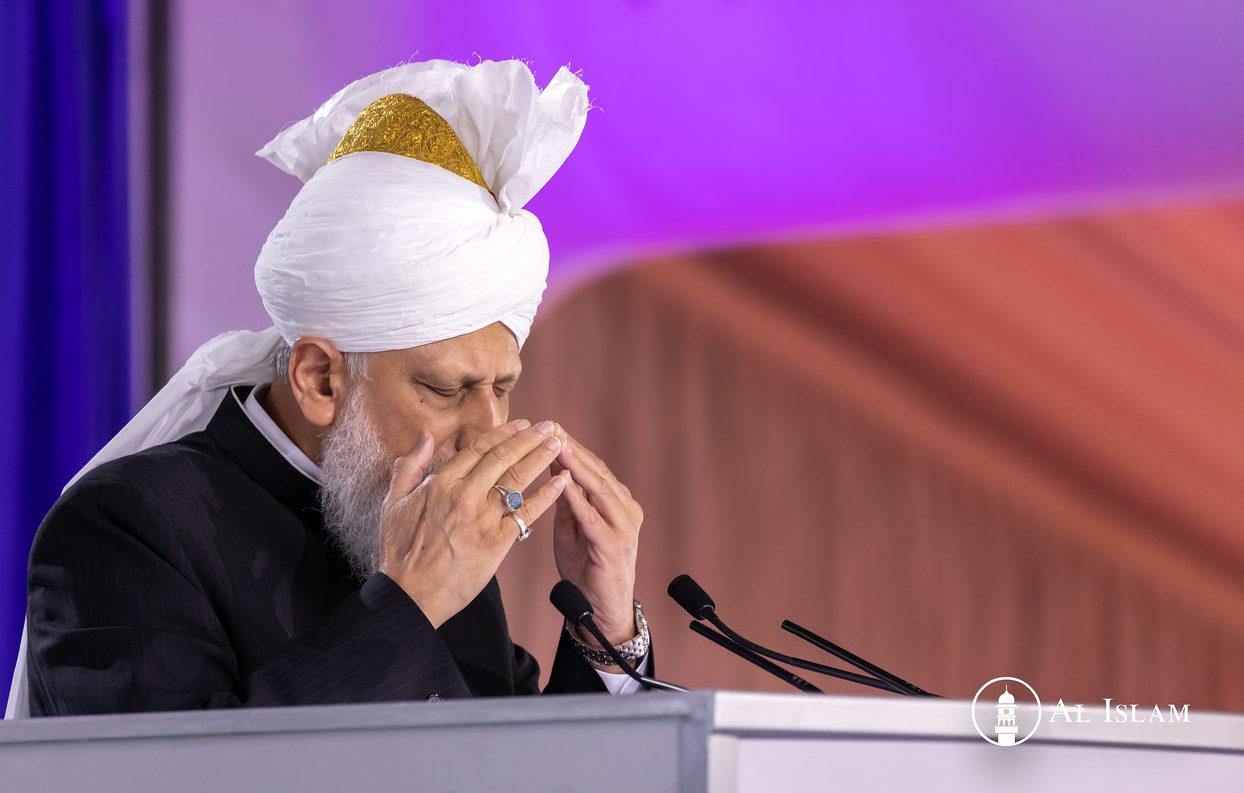Conflict being an inevitable characteristic of human society, a course to peace can only be charted when man imbibes the noblest of moral virtues.
BASHARAT SAIGAL, KOLKATA
JULY 25, 2021
Man generally seeks to follow people whom he idolizes and whose characteristics he tends to emulate. In the present-day world, we find that people from different walks of life are admired and followed, among whom are movie stars, sportsmen and social media influencers. Given that a person’s character and personality can be deeply affected by the people whom he finds inspiration from, it is essential that man responsibly determine whose path he wants to follow.
Here the Holy Quran sets forth the example of Prophet Muhammadsa as the perfect model for mankind, following whom can bring about a great moral reformation in man. The Holy Quran states:
Verily you have in the Prophet of Allah an excellent model.[1]
In a world already pacing towards destruction, a course to peace can be charted only when the minds of people are directed towards qualities such as mercy and forbearance instead of greed and jealousy. Hence, the Holy Prophetsa, who is presented as the perfect model for man, is complimented by the Holy Quran in the following words:
And We have sent thee not (O Muhammad) but as a mercy for all peoples.[2]
This mercy is not limited to those who follow him, instead, it applies unequivocally to everyone – believers and non-believers, friends and foes alike. Any person who claims to follow the Holy Prophetsa is, thus, likely to acquire a share from this mercy which then would be manifested in their persons and exhibited to those around them.
It is when people forgo mercy and do not hesitate to usurp others’ rights to fulfil their own greed that chaos and turbulence find their way and disrupt world peace. Hence, the example of the Holy Prophetsa as the source of mercy for mankind is undoubtedly an imitable virtue which is the need of the time.
The person of the Holy Prophetsa was such a perfect embodiment of mercy that it is reflected in every aspect of his life. After facing constant opposition from his countrymen, when the Holy Prophetsa went to Taif to preach the peaceful teachings of Islam to its inhabitants, he was rejected and persecuted. The chieftains of Taif ordered the children and the riff-raff of the town to throw rocks and stones at the Holy Prophetsa. Hence, the Holy Prophetsa was badly wounded and bled profusely that his feet became clotted to his shoes. He somehow got out of the city and took refuge in a nearby orchard.
At this instance, the Angel of the mountains came to him and said that if he so commanded, he would bring the two mountains of the valley of Taif together upon its people and destroy them. But the Holy Prophetsa said, “Nay! I hope that Allah will bring forth from their loins those who will worship the one true God”[3]. This is a prime example of how forgiveness and mercy were ingrained in the nature of the Holy Prophetsa. Having such virtues will develop love and compassion between people and prevent any kind of wars or events that lead to disruption of peace.
Justice is another inevitable prerequisite for the establishment of peace. It is extremely essential for a society or a country to be just for it to be harmonious. The Holy Prophetsa sets an unparalleled exampled in this regard as well. He has laid great emphasis on fulfilling the requirements of justice. We find the following commandment in the Holy Quran:
O ye who believe! be strict in observing justice, and be witnesses for Allah, even though it be against yourselves or against parents and kindred.[4]
The life of the Holy Prophetsa provides the most exemplary practical demonstration of this teaching. Once, when a woman belonging to a noble Arab tribe was sentenced to be punished for theft, many companions interceded for her. The Holy Prophetsa was enraged by this and said that he would have punished his own daughter Fatima with the same punishment had she committed that crime[5]. Such was his concern for the fulfilment of justice.
Another very important characteristic of the Holy Prophetsa which, if imbibed by all people of the world, can replace the prevalent restlessness in our society with peace is his respect towards other faiths and worldviews. Despite the fact that the Holy Prophetsa was appointed by God to establish the ideological supremacy of Islam and its teachings, he made it very clear that religion is a person’s individual matter and that no one can be coerced into or out of any faith. Hence, the Holy Quran says:
Let there be no compulsion in religion.[6]
Similarly, at another place, it is stated:
For you your religion, and for me my religion.[7]
This teaching was also perfectly demonstrated by the Holy Prophetsa in his life. Not long after migrating to Medina, the Holy Prophetsa formulated a treaty with the people of other faiths inhabiting the city, thereby laying a foundation for a structured government in Medina. One of the most important conditions of the treaty was that everyone will enjoy religious freedom and that the lives and properties of every tribe will be protected, should any outside force attack Medina.[8]
His respect for the people of other faiths is exemplified in yet another incident. Once a funeral procession passed by and as a mark of respect, the Holy Prophetsa stood up. Upon seeing this, the companions said that it was the funeral procession of a Jewish person. The Holy Prophetsa responded, “Is he not a soul?”.[9]
Despite all this, some critics who are blinded by prejudice or ignorance refer to the wars fought by the Holy Prophetsa and try to assert that Islam sanctifies forced conversions. However, they are ignorant of the fact that permission to fight was granted to Muslims only in defence of their lives and properties. This was given solely for the reason that despite Muslims’ yearning for peace, the disbelievers wanted to destroy Islam and its followers. The truth is that the fundamental purpose of such defensive wars was to establish religious freedom and protect the places of worship of other faiths as well as it is evident from the verse:
Permission to fight is given to those against whom war is made, because they have been wronged — and Allah indeed has power to help them. Those who have been driven out from their homes unjustly only because they said, ‘Our Lord is Allah’ — And if Allah did not repel some men by means of others, there would surely have been pulled down cloisters and churches and synagogues and mosques, wherein the name of Allah is oft commemorated.[10]
However, the Holy Prophetsa was so excellent in his nobility that even during those wars, he gave such instructions to his followers regarding justice and fairness that even the most contemporary advocates of humanity are put to shame.
Alas, but the world did not give this epitome of mercy the respect and honour he truly deserves. His person is often blasphemed, image tarnished, and name vilified. But for those whose intellect is not tainted by prejudice, his life still remains a perfect example of magnanimity, following which a person can reach the zenith of human virtues.
The author holds a master’s degree in technology from the Indian Institute of Technology (IIT) Delhi.
REFERENCES
[1] Holy Quran 33: 22
[2] Holy Quran 21: 108
[3] Sahih Bukhari, Kitab Bad’-al-Khalq (The Book on Beginning of Creation)
[4] Holy Quran 4: 136
[5] Sahih Bukhari, Kitab-al-Hudood (The Book on Punishments)
[6] Holy Quran 2: 257
[7] Holy Quran 109: 7
[8] Al-Sirat-al-Nabawiyyah by Abu Muhammad Abdul Malik bin Hisham pp. 353-355
[9] Sahih Bukhari, Kitab-al-Janaiz (The Book on Funerals)
[10] Holy Quran 22: 40-41












2 Comments
Sayeda tayyaba Yasmin · July 26, 2021 at 6:46 am
Good
Shareef · September 9, 2021 at 11:09 am
While it is true that the Holy prophet displayed many good qualities and moved his society forward in almost all areas there are aspects of his teachings or conduct we would not consider as role models today. A good example would be slavery. There is no doubt that he improved the conditions of slaves at the time and encouraged his followers to free them as much as possible. But at the same time, he continued to capture slaves as prisoners of war including women. Allowed for sexual relations with women slaves as bondswoman outside regular marriage and so on. So in that respect, he would not be a role model for the 21st century as our morality has evolved beyond those teachings to the level that slavery is not acceptable at all.
To take another example, allowing husbands to hit their wives even if below the knees and without leaving marks. Not only would it not be role model behaviour today, it would be illegal in most countries.